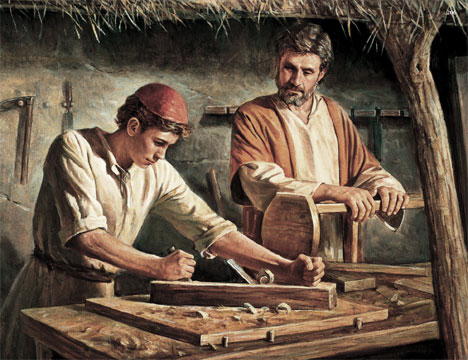Apr
12
2013
 “And, most heartbreaking, most breathtaking of all, is His willingness to actually become the veil, the flesh that was torn away to reveal the “naked” mind of the Father, the unhidden face of His mission for a bride for His Son.”
“And, most heartbreaking, most breathtaking of all, is His willingness to actually become the veil, the flesh that was torn away to reveal the “naked” mind of the Father, the unhidden face of His mission for a bride for His Son.”
“And the Lord was sorry that he had made man on the earth, and it grieved him to his heart.” (Genesis 6:6)
“But concerning that day and hour no one knows, not even the angels of heaven, nor the Son, but the Father only. For as were the days of Noah, so will be the coming of the Son of Man.” (Matthew 24:36-37)
The relationship between the Father and the Son is an eternal to-and-fro. It is this primary “chiasm,” a “there-and-back-again,” a forming and a filling, which gave shape to the Creation Week and every facet of the Word of God and of human life.
This post has been slain and resurrected for inclusion in my 2015 book of essays, Inquietude.
Continue reading
12 comments | tags: Angels, Flood, Genesis, Marilynne Robinson, Moses, Noah, Open Theism, Tabernacle | posted in Bible Matrix, Biblical Theology
Jan
26
2012

Author Marilynne Robinson writes about the Bible in the New York Times:
The Bible is the model for and subject of more art and thought than those of us who live within its influence, consciously or unconsciously, will ever know.
Continue reading
Comments Off | tags: Marilynne Robinson | posted in Quotes
Jul
30
2010

Art is man’s interpretation of the world, but the world itself is the original art. Everything is physical, literal, historical, but everything is also symbol. This is not an interpretation imposed upon what we observe. The Creation was actually made as symbol. Without the Word of God, we are rendered unable to interpret it. [1]
The meaning of the sun, moon and stars in Genesis 1 is not simply a poetic idea. The purpose of the heavenly lights is actual and practical. Moreover, it will be measured out in human flesh over and again throughout history.
Continue reading
Comments Off | tags: Abel, Animism, Cain, Creation Week, Genesis, Literary Structure, Marilynne Robinson | posted in Biblical Theology, Creation, Quotes
Jan
23
2010
or Calvinists are Never Surprised

“A Puritan confronted by failure and ambivalence could find his faith justified by the experience, could feel that the world had answered his expectations.”
Continue reading
4 comments | tags: Calvinism, Communism, Marilynne Robinson, Postmillennialism | posted in Quotes
Jul
21
2009

“I gave the sermon on Hagar and Ishmael today… I began my remarks by pointing out the similarity between the stories of Hagar and Ishmael sent off into the wilderness and Abraham going off with Isaac to sacrifice him, as he believes. My point was that Abraham is in effect called upon to sacrifice both his sons, and that the Lord in both instances sends angels to intervene at the critical moment to save the child. Abraham’s extreme old age is an important element in both stories, not only because he can hardly hope for more children, not only because the children of old age are unspeakably precious, but also, I think, because any father, particularly an old father, must finally give his child up to the wilderness and trust to the providence of God. It seems almost a cruelty for one generation to beget another when parents can secure so little for their children, so little safety, even in the best circumstances. Great faith is required to give the child up, trusting God to honour the parents’ love for him by assuring that there will indeed be angels in that wilderness.
I noted that Abraham himself had been sent into the wilderness, told to leave his father’s house also, that this was the narrative of all generations, and that it is only by the grace of God that we are made instruments of His providence and participants in a fatherhood that is always ultimately His.”
Reverend John Ames, in Gilead by Marilynne Robinson, p. 128-129.
Comments Off | tags: Abraham, Marilynne Robinson, Parenting | posted in Christian Life, Quotes
 “And, most heartbreaking, most breathtaking of all, is His willingness to actually become the veil, the flesh that was torn away to reveal the “naked” mind of the Father, the unhidden face of His mission for a bride for His Son.”
“And, most heartbreaking, most breathtaking of all, is His willingness to actually become the veil, the flesh that was torn away to reveal the “naked” mind of the Father, the unhidden face of His mission for a bride for His Son.”



























